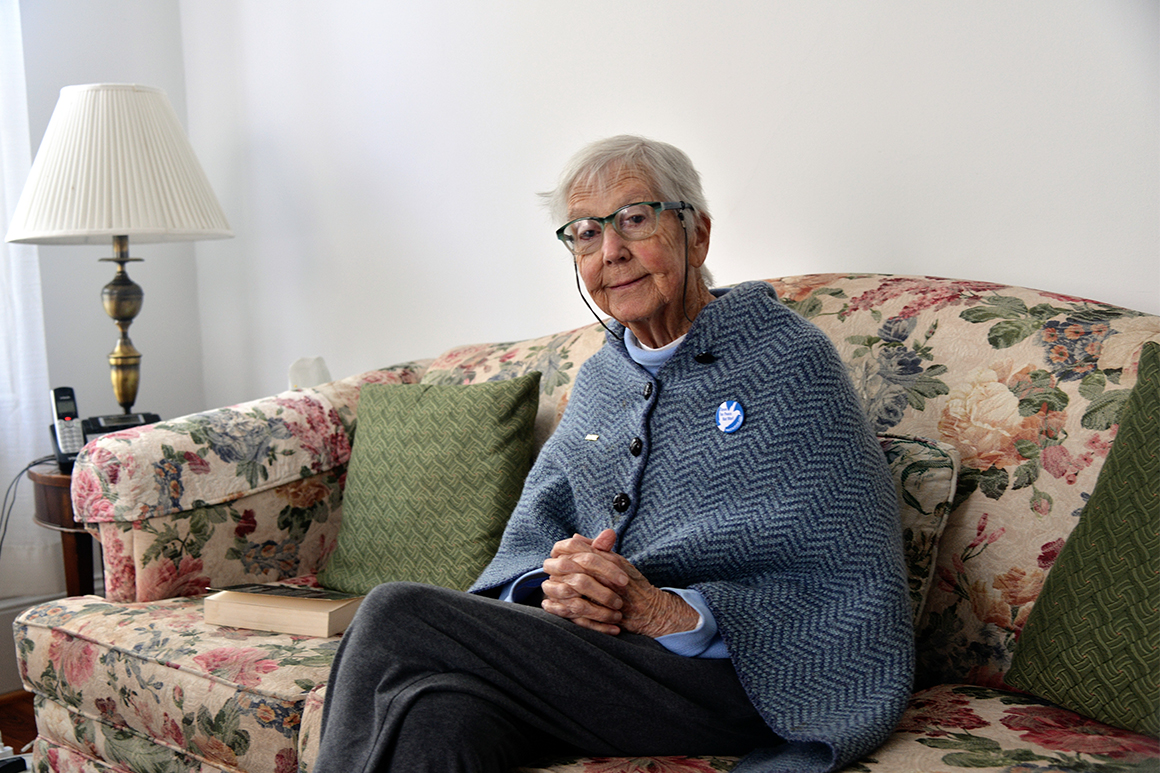
In the wee hours of July 28, 2012, Sister Megan Rice and two other protesters snipped a chain-link fence at the Y-12 nuclear weapons production complex in Tennessee, walking past broken security cameras and into history. After spray-painting the walls with anti-nuclear slogans and even scattering blood, they lit candles, prayed and sang joyfully while awaiting arrest. When the first security guard arrived, Rice offered him some home-baked bread as a gesture of peace.
This became one of the best-known protests by the anti-nuclear movement Plowshares, whose name is a biblical reference to turning weapons into food for the hungry. Rice and her companions spurred congressional hearings over the shockingly lax security at Y-12; members of Congress even thanked the protesters before the trial. The trio was convicted of sabotage—harming the nation’s ability to defend itself.
I became friends with Rice in 2017, when I lived with a group of progressive, activist Catholic sisters and helped them open Anne Montgomery House in Washington, D.C., named for Rice's late mentor in nuclear protest. Rice struck me as one of the most open, centered people I had ever met. When I searched online for information, I learned she had been arrested more than 40 times. Why? Anti-nuclear action was part of it, but Rice framed her activism more globally. To understand her life’s work, it’s important to look beyond the protest that made her most famous and see it the way she did: as part of a broader struggle for racial and economic justice.
Rice made the connection between the nuclear arms buildup and poverty at an early age. Race-based disparities in housing, jobs, and health care were regular dinner table topics when she was growing up in Manhattan in the 1930s and '40s. Her mother, a history professor, wrote her dissertation at Columbia University on American Catholic attitudes toward slavery. Her father, the head of obstetrics at Bellevue Hospital, lectured and published on health disparities affecting women of color who lacked access to health care. The Rice family lived near Columbia, which received some of the earliest federal funding for the nuclear weapons research that became the Manhattan Project. They were friends with Dorothy Day, today a candidate for Catholic sainthood, whose writings taught Rice to view the exorbitant cost of nuclear weapons as direct theft from people around the world suffering from poverty, in want of shelter, food, medicine and education.
After graduate school, Rice spent 40 years teaching biology and math to girls in Nigeria and Ghana. Toward the end of her time in Africa, Rice began returning more frequently to the U.S., where she’d join anti-nuclear protests at the Nevada Desert Experience. Her sense of racial injustice led her to deplore the way nuclear weapons had desecrated Native American regions. She and her mother made the Sacred Peace Walk, a 55-mile pilgrimage from the National Atomic Testing Museum in Las Vegas to the Nevada National Security Site, where hundreds of nuclear tests were conducted on the Western Shoshone Nation's sacred land.
For the protest at Y-12, Rice was sentenced to three years in prison, longer than usual due to the sabotage charge. Crammed in with more than 100 women in Brooklyn's Metropolitan Detention Center, she encountered atrocious conditions and inadequate health care. Rice became an effective ally for women of color who were impoverished and caught in the system.. She took up the causes of women serving excessively long sentences for nonviolent crimes and launched a prayer circle and book group, enthusiastically joining the ranks of previous Plowshares activists who taught while imprisoned as an extension of their ministries.
Two years into her sentence, that sabotage conviction was overturned. The judge who wrote the majority opinion was incredulous that any "rational court" could conclude that three peace activists had actually harmed the national defense, exclaiming at one point, "With a loaf of bread?"
The vindication was a shock for Rice, who heard about her impending release on the BBC. She was swept away from women she had grown to love, with no time for a proper goodbye. She had actually hoped to end her long and happy life in prison. As she told the judge at her sentencing, "To remain in prison for the rest of my life is the greatest honor that you could give to me.” She later said, “Good Lord, what would be better than to die in prison for the anti-nuclear cause?” Although she came out of prison to wide media acclaim, Rice’s heart remained with those incarcerated women she left behind in Brooklyn.
Plowshares’ anti-nuclear vision is gaining international credibility. In 2017, Pope Francis hosted a conference to declare that the possession or use of nuclear weapons was “to be firmly condemned." Nuclear weapons became broadly illegal with this year’s entry into force of the landmark Treaty on the Prohibition of Nuclear Weapons, for which the International Campaign to Abolish Nuclear Weapons won the 2017 Nobel Peace Prize. There isn't anything close to global consensus yet, but it's growing. The moral leadership of Catholic sisters like Megan Rice has helped future generations understand her deeply held conviction that nuclear weapons don’t just threaten the planet; they also further impoverish the poor.
----------------------------------------
By: Carole Sargent
Title: Sister Megan Rice: A Catholic Activist Who Saw Nuclear Weapons as a Social Injustice
Sourced From: www.politico.com/news/magazine/2021/12/27/2021-obituary-megan-rice-520597
Published Date: Mon, 27 Dec 2021 05:01:32 EST
Did you miss our previous article...
https://consumernewsnetwork.com/politics-us/an-explosive-whisper-campaign-was-launched-to-try-and-sink-the-pick-of-a-biden-ambassador






